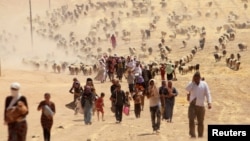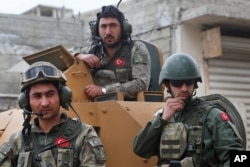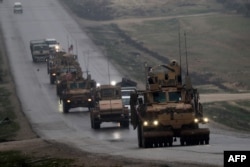Minorities in northeastern Syria are concerned the withdrawal of U.S. troops from the country without putting in place a sustainable alternative would lead to a security vacuum that could be filled by remnants of extremist groups, including the Islamic State (IS) in the country.
The Free Yezidi Foundation, a Netherlands-based group advocating for justice for Yazidis — a religious minority in Iraq and Syria — warned in an official statement the Yazidis would face an “existential threat” from several militant groups hostile to them and other religious and ethnic minorities in the country after the departure of U.S. troops.
“Any premature withdrawal of the United States forces from Syria not only endangers religious minorities in Iraq and Syria, it vastly increases the likelihood of a resurgent Daesh militant power. This is an existential threat to minorities like the Yazidis,” the Free Yezidi Foundation said in a statement, using an Arabic acronym for the Islamic Static terror group.
Potential for Turkish incursion
Pari Ibrahim, the founder and executive director of the foundation, told VOA that minority groups, including Yazidis, are concerned about a potential Turkish military incursion into northeastern Syria, and also in the last pockets held by IS that still are being cleared by U.S.-backed Syrian Democratic Forces (SDF).
“The coalition, and not only the U.S., can combat this by making sure that SDF remains a multi-ethnic, multicultural force that will protect that part of Syria, prevent [the] rise of extremism, and absolutely ensure no jihadist forces or their allies can be bombing in the area,” Ibrahim said, making a reference to Turkey and its anticipated military operation, including a potential aerial campaign.
Christian Suryanis, an ethnic religion whose members live in northeastern Syria, Damascus and Aleppo, also have voiced concerns and urged the international community to protect Christians and prevent them from being displaced from their homes.
“A state of chaos and vacuum would occur in the area after the U.S. withdrawal, therefore, there is a need for long-term security arrangements that secure a free and democratic state for all in northeastern Syria,” the group said in a statement last week.
Christian Suryanis speak the Syriac language.
Syria is home to several ethnic and religious minority groups. There is no recent official census on the exact number of minorities in the country. The last Syrian government census was in 1985.
According to estimates from Minority Rights Group International, a U.K.-based human rights group serving minorities around the world, Sunni Muslims make up 75 percent of the Syrian population, followed by 10 percent Christians, and the remaining groups are other religious minorities, including Druze, Ismailis, Shiites, Sufis, Alawites and Yazidis.
Beginning of withdrawal
The warnings from minority groups in Syria come at a time when the U.S.-led coalition in Syria on Thursday officially began the removal of equipment from the country.
The coalition “has begun the process of our deliberate withdrawal from Syria,” said Col. Sean Ryan, a spokesman for the U.S. coalition fighting IS.
“Out of concern for operational security, we will not discuss specific timelines, locations or troop movements,” Ryan said.
There are roughly 2,000 U.S. military personnel in Syria.
The Syrian Observatory for Human Rights reported the equipment withdrawal began late Thursday, when about 10 armored vehicles and other equipment were pulled from a U.S. base in Rmeilan in Hassakeh province.
Turkey’s offensive
Minority groups also are concerned about the prospect of a possible Turkish military incursion into Syria.
In December 2018, Turkish President Recep Tayyip Erdogan announced his country’s intention to plan a military operation against the Syrian Kurdish People’s Protection Units (YPG), which are among the SDF.
Erdogan later delayed the planned offensive, citing talks with U.S. officials, including President Donald Trump, following the U.S. decision to withdraw its troops from Syria.
Turkey views the YPG as an extension of the Kurdistan Workers’ Party (PKK), a U.S.- and EU-designated terror group, but Washington differs with Ankara and considers the YPG a crucial ally in the fight against IS.
WATCH: Why Turkey Is Attacking YPG
U.S. Secretary of State Mike Pompeo, during his weeklong trip to Middle East, assured allies Thursday that despite the U.S. decision to withdraw its forces from Syria, it remains committed to fighting IS and preventing the group from growing.
“We are going to do it in a way in one particular place — Syria — differently,” Pompeo said. “The United States’ decision — President Trump’s decision — to withdraw our troops has been made. We will do that.”
VOA’s national security correspondent Jeff Seldin contributed to this report from Washington.








